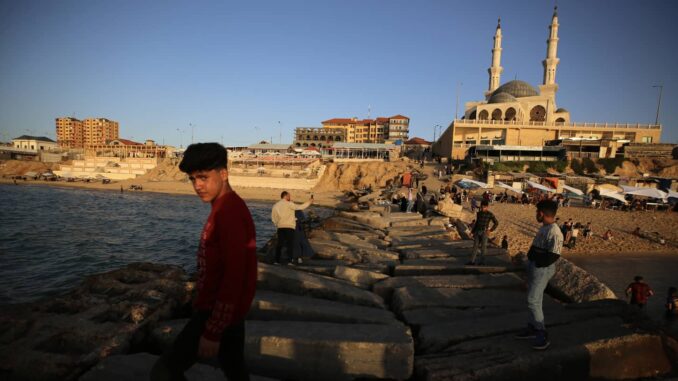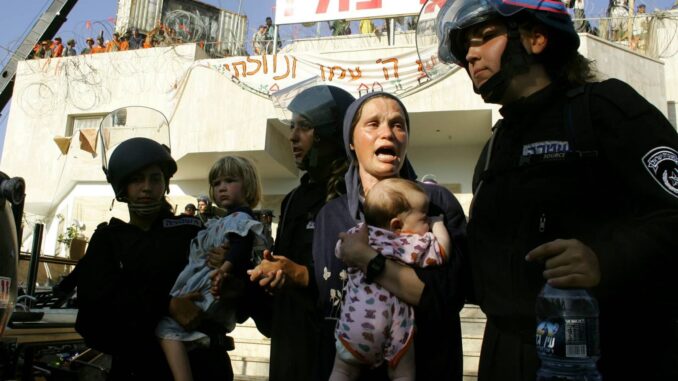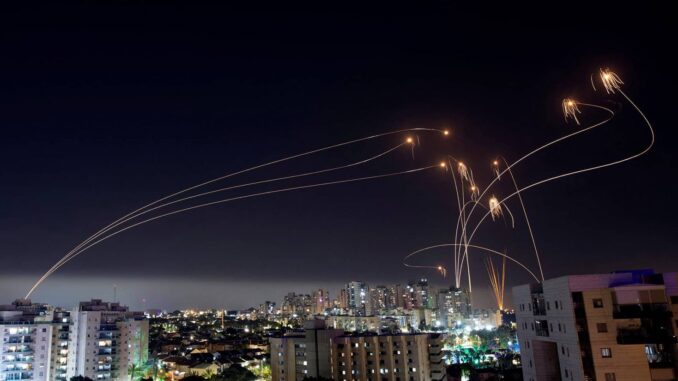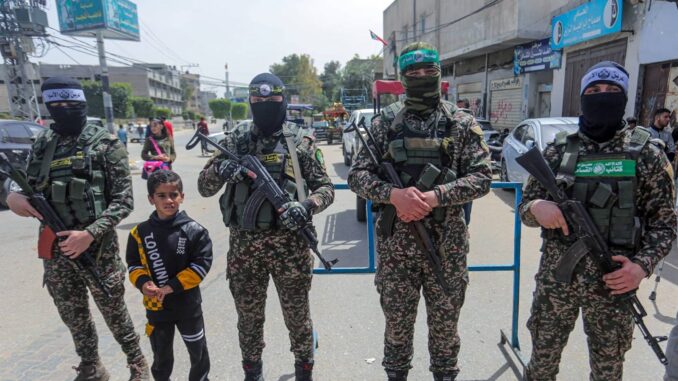by May 2023

Gaza, April 2023. Photo credit: Majdi Fathi via Reuters Connect
Israel’s current policy towards Gaza is based on deterrence, reinforced with periodic military operations. But the military capabilities of Hamas and Islamic Jihad are growing. Israel should actively consider alternatives to its current strategy as I outline here.
Background
The Gaza Strip, known as Gaza, is 365 square kilometers with a population of slightly over 2 million. It was captured by Israel (along with the Sinai Peninsula) from Egypt during the 1967 Six-Day War.
In 1979, Egypt and Israel signed a peace treaty which called for Israel to return the entire Sinai Peninsula to Egypt while Gaza and the West Bank would be retained by Israel pending the outcome of future autonomy talks. Many Israelis (including me) believe Israel at the time should have insisted that Egypt take back Gaza just like the other territories taken by Israel from Egypt in 1967. Egypt rather than Israel could have retained Gaza, pending the outcome of autonomy talks.
Gaza’s people are mainly descendants of Palestinian refugees from the 1948 war. After 1967, Israel started establishing settlements in Gaza which by 2005 had some 8,600 Israelis living on about 20 percent of Gaza’s overall territory. These Israeli settlers’ security was heavily dependent on a massive Israeli military presence in Gaza, which grew as a result of the two Palestinian uprisings of 1988-1993 and 2000-2005.

The Disengagement from Gaza
In 2004, the Israeli government of Prime Minister Ariel Sharon decided to unilaterally evacuate the entire Jewish population along with all of the IDF forces from Gaza in what Israelis call the Disengagement Plan. As the National Security Advisor, I was instructed by Sharon to create the operational plan for the evacuation, which I carried out despite harboring some doubts.
I believed that getting out of there was inevitable. However, I thought that the unilateral way in which the Israeli government chose to do so was not the best course of action.
The wiser policy in my opinion would have been to approach the international community first and present the Disengagement Plan as a potential concession that Israel would be willing to make. The full handover of Gaza to the Palestinians would be a part of a more comprehensive solution to the Israeli-Palestinian conflict which would also include a vision for the future of the West Bank. The handover to Gaza would be a first step.
This, I believe, would have given Israel enough leverage in the negotiations to achieve its interests regarding a partial retreat from the West Bank that did not meet the Palestinian demands (which had been the reason for the failure of previous attempts to reach an agreement). Moreover, I thought Egypt could cede to Gaza some adjacent territory on its side of the border (which was scarcely inhabited anyway) in return for some other benefits. It would make Gaza a more viable place to live.
What happened instead is that Israel gave up Gaza “for free” without gaining anything in return.
My view on the matter hasn’t changed. I remain convinced that we missed a big opportunity (maybe the last opportunity) to resolve the conflict and achieve the two-state solution that has been favored by the entire international community.
Gaza after the Disengagement
Israel implemented the Disengagement Plan in 2005, forcibly evacuating the Israeli settlers. In 2006, parliamentary elections took place in Gaza. Hamas, the radical Islamist movement, defeated Abu Mazen’s Fatah movement. In July 2007, Hamas violently overthrew the Palestinian Authority in Gaza and has been ruling there since then.
As opposed to what many people think, Hamas isn’t an external terrorist organization that managed to take over Gaza and rule it only through force. Hamas is rather an authentic movement that grew within the people of Gaza and was elected by them.
Hamas through the years has invested in efforts to arm itself and actively resist Israel – along with the Islamic Jihad movement which somehow remained independent. Mostly they fire rockets at Israeli towns and agricultural communes in the immediate vicinity of Gaza. Israel in return maintains tight border controls and strictly supervises the flow of people and goods into and out of Gaza, in coordination with Egypt. Israel also supplies Gaza its electricity, water, gasoline, and other essentials since Gaza doesn’t have the means to survive on its own.

When tensions periodically escalate, Israel conducts military operations against Gaza, including air strikes and sometimes ground invasions, as happened in 2008-2009, 2012, 2014, 2021, and most recently in May 2023 aimed strictly at Palestinian Islamic Jihad.
In my view, Gaza is a de facto independent state. It possesses the four major characteristics that define a geographical region as a national state: well-defined borders, effective central government, an independent foreign policy and an army.
Therefore, Israel should refer to Hamas as the government of Gaza and not treat it as a “terrorist organization,” despite the fact that Hamas applies terrorist tactics.
Israel’s Policy Options
Currently, Israel has four different options regarding Gaza:
The status quo
In this strategy, Israel seeks to deter the military threat from both Hamas and Islamic Jihad. Most of the time the situation will be calm since Hamas has strong incentives to keep the ceasefire. But every few years or even once per year there will be a round of violence that lasts days and sometimes even weeks. In these confrontations, Gazans will launch hundreds of rockets against Israeli civilians but the damage will be minor, especially in terms of casualties, mainly due to Israel’s anti-rocket systems. Israel will attack hundreds of military targets in Gaza and target Gazan military leaders.
A comprehensive military operation in Gaza
The goal of this strategy is more ambitious than deterrence. It is to destroy most of the weapons systems, the facilities where weapons are produced and the command-and-control systems of both Hamas and Islamic Jihad. Israel would have to deploy extensive ground forces simultaneously. These forces would not necessarily have to conquer every part of the Gaza Strip but would need to reach the heart of the most populated and armed neighborhoods. This operation, including the phase of purging terror cells, might last a few weeks and would probably cause many casualties on both sides, including non-combatants in Gaza. After the operation, Israel would withdraw its forces from Gaza. Israel conducted a similar operation in the West Bank in April 2002.
Reoccupation of the Gaza Strip
From the military point of view the initial phase of this strategy might look like the previous one, but the political goal would be different. The goal is to occupy all parts of Gaza and to remain there at least until the signing of a reasonable political arrangement which would ensure that Gaza will cease to be a base for heavily armed terrorist groups.

Reaching a long-term ceasefire with Hamas
Hamas must balance two conflicting interests. On the one hand, it is the government of the de-facto state of Gaza, and must rebuild the infrastructure of the state, offer employment to people and supply better living conditions to a growing population. On the other hand, Hamas is a jihadist organization seeking to replace the Palestinian Authority as the leader of all Palestinians, including in the West Bank, and bring about the destruction of Israel some day.
Israel, in order to support the primacy of the first interest, could offer to assist Hamas to improve Gaza’s economy by allowing tens of thousands of people to work in Israel, by building more civilian infrastructure, by creating a seaport in Gaza and by allowing Gaza to produce natural gas from its offshore field. However, if rockets were to be launched (or any other terrorist act) from Gaza, Israel would shut down all of these supportive activities, attack and destroy Gaza’s national assets and stop the supply of water, gasoline and other essential goods.
Summary
Gaza remains a continuous nuisance for Israel as a result of Israel’s agreement in 1979 to return the Sinai peninsula to Egypt but to keep Gaza awaiting Palestinian autonomy talks.
Israel’s 2005 disengagement from Gaza should have been leveraged to conduct a comprehensive and improved deal with Palestinians. The unilateral withdrawal was a mistake.
Gaza should be treated as a de facto independent state.
Of Israel’s four possible policy options, I believe it should explore the fourth one – the possibility of entering into a deal with Hamas to dramatically support its economic development in exchange for a long-term ceasefire. This allows Israel to increase its leverage over Hamas, offering economic incentives while maintaining military deterrence.
Major General (ret.) Giora Eiland, a frequent commentator in the Israeli media, was the National Security Adviser to Prime Minister Ariel Sharon from 2004 to 2006. Before that, he was a career officer in the Israel Defense Forces and served as the Head of Operations and the Head of Planning of the General Staff. Photo credit: Kai Mörk



to Maj.-Gen. (retd?) Giora Eiland: Nice try but half measures never work in the long run. You made your big mistake in advising Sharon in 2005 about withdrawing Jews from Gush Katif. One mistake is enough. 1. status quo/ unacceptable by all standards–no end in sight. 2. Comprehensive military op/ good, but weigh in the price in lives–not worth going in and then going out every few years (or more often). 3. Re-occupation/ generals should know how to solve tactical military problems and the civilian type too. This is something that needs more planning, but the best choice combined with #2. First disarm or destroy all military weapons and production facilities and rid Gaza as a potential rocket launching base.
4. reach agreement with WHOM? this is mad and nutso. The Gen. admits he made a ‘mistake’ –in big time. How about suggesting we resettle GUsh Katif and Gaza altogether with Jewish towns and villages?
One thing is for sure. Gaza can never be an ‘independent’ and sovereign state. No energy or resources. Did the General forget who he said is supplying Muslim Gaza with electricity, gas, and water (often without paying for them)? Not to forget jobs for the ‘poor’ unemployed Arabs (in Israel, of all places!). 5. (my policy suggestion/ How about sending all the “Gazans” to Saudia Arabia or Dubai in a kind of population transfer for the sake of peace?
To dreuveni: we will get to your revisited prophetic vision of the whole world (EU, USA, and others–for certain, including Arab and Muslim countries) rising up against Israel no matter if Israel only fights in self-defense and when provoked in the extreme (1000 rockets isn’t enought??).The end of days say some are almost here.
While mentioning Egypt, let’s not forget that they also have a border with the Gaza Strip. Why do they get off scot free?
Great idea, let them open a sea port so they can smuggle in whatever they can’t through Egypt.
As we all know, or should know, retaking the Gaza Strip is not a simple task. The Arab fighters hide behind their civilian population and booby trap everything. In order to avoid Israeli casualties, these buildings must be destroyed, whether occupied or not. Of course, the humane Israelis always warn their opponents before hand, but the charges of war crimes just keep piling up. Since this is obviously the case, the Israeli offensive must be willing to cause collateral damage to, at least, property. If terrorists get in the way, so much the better, but since they all look like civilians, who can tell the difference?
On the issue of war crimes, it has become clear that any young woman with a screaming voice (from Biden on down) can incite people to make “humane” demands of the Israelis, which, for whatever reason, are taken seriously but the Israelis and the rest of the world. Herein lies the source of the problem: Israel is all too willing to back down to these demands at the expense of its own population. Even Jewish voices, especially in USA. Canada and Europe, call for the Israelis, their own relatives, to appease the rest of the world and agree to commit suicide.
Even the so-called Samson Option would never happen because that would be a war crime too.
Attacking the Iranian nuclear sites is on the same level. If Israel were to destroy these sites in order to avoid a nuclear attack, it would face war crime charges from the rest of the world and probably military action too from all of Iran’s allies, including, probably, even the “friendly” USA and the EU.
Was this different from Dayan giving up the Temple Mount, or Barak running out of South Lebanon, or Rabin signing a crooked deal with a supper-terrorist?
In every case Israel got NOTHING but deaths!
Who coerced them into one way concession?
Note that as already mentioned the water, fuel, food and electricty should be cut off BUT for two months before going into Gaza – while talks and rockets are on. It is impossible to disguise an impending attack on the place which will be a hard battle on their prepared ground, so starve it in a real siege first. The perfect precedents are the mutual maritime blockades between Britain and Germany in both World Wars when both quite openly set out to starve the other into submission – and one succeeded.
Second reverse the political rhetoric. This conflict is NOT about Gaza’s independence and responsibility but about Gaza / Hamas accepting and recognising Israel’s realtiy and rights to self determination independence and all the rest of the sand Hamas throws in the eyes of a willingly blind World.